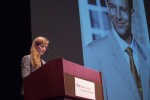U.S. Ambassador Samantha Power warned the UCLA community Sunday that there are growing dangers threatening the free press and thus the public’s ability to sufficiently understand global conflicts.
Power, the U.S. permanent representative to the United Nations, said in a lecture Sunday night that foreign governments in Syria, China, Egypt, Turkey and several other countries are repressing journalists’ and the public’s right to information. She cited examples of how such countries use bribery, censorship laws, controlled news outlets and the harassment and imprisonment of journalists to limit access to the truth and benefit themselves as they handle civil unrest.
“This is truly a theatre of the absurd,” Power said.
Power gave her speech as part of the Daniel Pearl Memorial Lecture, an annual talk that honors a Jewish-American journalist who was kidnapped by Pakistani militants then killed by a member of al-Qaida. Pearl was murdered while investigating the connection between a terrorist attack attempt in the U.S. and al-Qaida.
Power said Pearl’s story shows how important it is that Americans not take for granted their freedom of press and calls for this freedom in foreign countries.
Kal Raustiala, director of the UCLA Burkle Center for International Relations, said Power’s earlier experiences covering the Yugoslav wars as a journalist and focus on human rights made her an appropriate speaker for the Daniel Pearl Memorial Lecture.
As the use of “grassroots” forms of journalism such as blogging and social media grows more prevalent, Power said the desire to control this information also grows in foreign governments.
“Today, here at home and around the world … the struggle is intense to control information and to shape perceptions about what is true,” Power said. “But many governments lack confidence in their own legitimacy or in the credibility of their policies. So what do they do? They try to rig the game.”
She cited Syria – which she called “the most deplorable humanitarian situation on the planet Earth” – in particular as an obstacle to free press. Because the Syrian government limits journalist access, she said, people have to use YouTube videos, Twitter and other “homegrown” ways of spreading knowledge of the country’s violent civil war.
By contrast, Power praised the U.S. as a champion in promoting freedom of press. She mentioned how President Barack Obama signed the Daniel Pearl Freedom of the Press Act, through which the U.S. government promises to watch out for how foreign countries treat American journalists.
Before becoming a U.N. ambassador, Power worked closely with Obama in addressing human rights and other international issues as special assistant to the president and senior director for multilateral affairs and human rights for the National Security Council.
“(Power) made sure that some of the most pressing moral issues were met by policies that don’t just do the right thing politically, but … save lives,” said Los Angeles Mayor Eric Garcetti, who also spoke at Sunday’s event. “We need more voices like hers because there’s not enough doing.”
In a more informal discussion after her lecture, Power stressed the need to take steps to resolve the conflict in Syria. On Saturday, Power and other representatives in the United Nations Security Council succeeded in passing its first unified resolution on Syria in three years calling for the country to allow cross-border humanitarian access to its war victims. She also said the United Nations needs to work on being more effective and quicker in its work.
At the end of Sunday’s event, Jacob Goldberg, former president of the Olive Tree Initiative, asked Power for her stance on the divestment from companies that profit from or are involved in the Israeli occupation of Palestinian territories. He mentioned a controversial resolution UCLA’s undergraduate student government will consider Tuesday that would call for the University of California to divest from several American and European companies that contribute to human rights violations in Palestinian territories.
Power said the United Nations is against the idea of boycotts and divestment in this context. She added that the Israeli-Palestinian conflict currently has a “meaningful chance of peace, dignity and ultimately prosperity” for both Palestine and Israel without using such tactics, and that it is important to include parties in discussion rather than exclude them.
“We oppose boycotts and divestments and do not feel as if they are appropriate in this context at all,” Power said. “(We) feel that they are disruptive to the most lasting way to bring about dignity and peace for both parties involved, which is this peace process that we have underway.”
Goldberg, a fourth-year international development studies student, later said he liked Power’s lecture and thought it had good insight about the freedom of speech. But he said he questioned whether her talk was influenced by the fact that she’s a government official and whether her responses might have been different if she was a journalist focused on human rights.
Contributing reports from Trevor Cleere, Bruin contributor.

Daniel Pearl has become the rallying cry for Islamophobic pro-Israel Jews all around the US. What a joke… such a discrace to see how they use one of their own to trash Muslims and to drum up fear about Palestine. Daniel wasn’t killed in Palestine. He was killed for being a ZIONIST